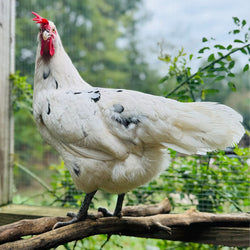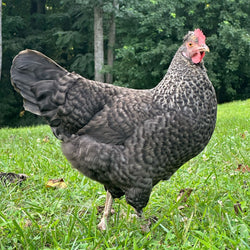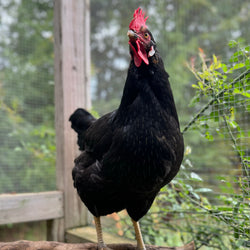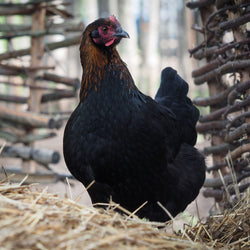f=menu&page=15/--
Frequently Asked Questions
Here we answer the most commonly-asked questions about ordering, chicken care, and more.
All about Avian Influenza (AI)
The idea of "Bird Flu" (Avian Influenza), also known as AI, or Avian Flu, may strike fear in the minds of chicken keepers because of past outbreaks. When fear is involved, it is difficult to think rationally, so it's a good idea to get informed! Knowledge is power, right? The Centers for Disease Control remind us that "No animal or human infections with Asian H5N1 virus have occurred in the United States," and the USDA reminds us that in the United States, the 2022 strain of Eurasian H5 Avian Influenza has not infected any human. The major concern for backyard...
Read MoreHow can I tell if my chicken has frostbite?
Cold weather can put your chickens at risk for frostbite, especially on their combs, wattles, and feet. Learn how to recognize the early signs, prevent severe damage, and treat affected birds safely. With proper coop ventilation, roosting space, and a few simple precautions, you can keep your flock warm and healthy all winter long.
Read MoreMy chicken has frostbite. How do I help them?
Frostbite on chickens usually affects the comb, wattle, and feet. Read below to learn how to treat your chicken, and how to make sure your coop is set up properly with adequate ventilation. Frostbite occurs when the body becomes very cold and sends a signal to constrict blood vessels in the extremities in order to direct more blood to vital organs. Because the flow of blood and oxygen to the affected parts of the body--such as the comb, wattles, and feet--is disrupted, the tissue may eventually freeze. Frostbite may cause minor damage to just the tips of the comb, wattles,...
Read MoreWhat are the best ways to prevent impacted crop, impacted gizzard, and sour crop in my chickens?
Impacted crop occurs when there is a blockage in your chicken's digestive tract, preventing food from traversing her system. Occasionally you may actually have a blockage further down, like an impacted gizzard. Sour crop---a bacterial overgrowth in her crop, typically an overgrowth of yeast---can occur when the digestive system is stalled with an impaction, but can also happen on its own if there's a pH imbalance, or if your chicken is eating rotten or moldy food. There are a few good strategies you can use to prevent impacted crop and sour crop in your flock. Feeding Feed fresh, good quality...
Read MoreWhat is vent gleet and how can I treat my chickens that have it?
In baby chicks, pasty butt (a.k.a. pasted vent) occurs when poo dries in the chick's vent (her pooper) and the blockage prevents her from defecating. This is a critical situation for a baby chick and should be addressed immediately because it can be fatal. By the time your bird is an adult layer, her muscles are pretty well developed for expulsion, and the vent can expand significantly (large enough to pass an egg, right?). So, adult hens seldom (perhaps never!) suffer from pasty butt. That said, they can certainly get vent feathers messy with loose poo, and that can...
Read MoreWhen should I take my pet chicken to the vet?
As keepers of pet chickens, we've all been there. You notice one of your birds exhibiting some unusual behaviors or symptoms, and you're faced with a dilemma: What do you do? What is causing the symptoms and how can you help? Is what you're seeing normal chicken behavior, a minor issue that may resolve itself, or serious problem that warrants a professional help? Let's be honest: You don't want to pay a big vet bill only to find out it's nothing serious, but you also don't want to assume it's nothing serious and have it turn out to be something...
Read MoreWhich chicken breeds may need extra heat in winter?
Chickens are incredibly adaptable! They are kept all over the world in all kinds of extreme climates. But it's no secret that some breeds are hardier in cold weather than others. Some breeds were not developed for cold-hardiness or have characteristics that make them more susceptible to cold than others. In a well-ventilated but not drafty coop, most chickens can stay warm by fluffing up their feathers to trap a layer of warm air against their bodies--as long as they are not wet and or exposed to a draft. Drafts can remove that "jacket" of warmer air surrounding the bird....
Read MoreCan I get Coronavirus (COVID-19) from my chickens?
Here's what the CDC says about COVID-19, as of November 2021: The risk of animals spreading the virus to people is low; the virus can spread from people to animals during close contact. More studies are needed to understand how different animals could be affected by the virus; people with the virus should avoid contact with pets, livestock and wildlife. The CDC also recommends that since all animals can carry germs that make people sick, that you should follow these healthy habits when you're around pets and other animals: Wash your hands after handling animals, their food, waste, or supplies....
Read More







"The Clubhouse" Coop
Easy to assemble and built to last, the Clubhouse Coop is the perfect starter coop for a small flock.











